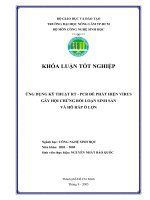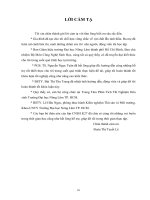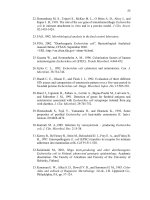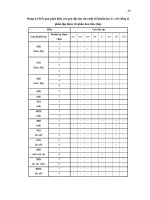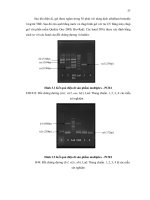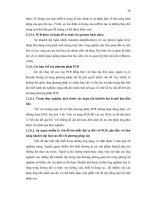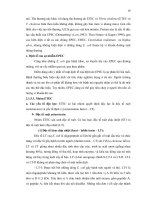Luận văn : Sử dụng kỹ thuật multiplex – PCR để phát hiện đồng thời các gen độc: stx1, stx2, eae, ehxA, và uid của E. coli part 5 doc
Bạn đang xem bản rút gọn của tài liệu. Xem và tải ngay bản đầy đủ của tài liệu tại đây (809.16 KB, 7 trang )
37
11. Calderwood S. B., Acheson D. W. K., Keusch G. T., Barret T. J., Griffin P. M.,
Strockbine N. A. et al, 1996. Proposed new nomenclature for SLT (VT) family.
ASM News. 62: 118 – 119.
12. Cebula T. A., Payne W. L., and Feng P., 1995. Simultaneous Identification of
Strains of Escherichia coli Serotype O157:H7 and Their Shiga – Like toxin
Type by Mismatch Amplification Mutation Assay – Multiplex PCR. J. Clin.
Microbiol. 33: 248 - 250.
13. Cerna J. F., Nataro J. P., and Teresa Estrada Garcia, 2003. Multiplex PCR for
detection of three plasmide borne genes of enteroaggregative Escherichia coli
strains. J. Clin. Microbiol. 41: 2138 - 2140.
14. Chalmer R. M., Salmon R. L., Willshaw G. A., Cheasty T., Looker N., Davies I.,
and Wray C., 1997. Verocytotoxin-producing E. coli O157 in a farmer
handing horses. Lancet. 349: 1816.
15. Dogan H. B., Kluleasan H., Cakin I., và Hallemam A. K., 2003. Evaluation of
increased incubation temperature và cefixime – telluride treatment for the
isolation of Escherichia coli O157:H7 from minced beef. J. Food Microbiology.
87: 29 -34.
16. Donnenberg M. S., Tzipori S., McKee M. L., O’Brien A. D., Alroy J., and Kaper
J. B., 1993. The role of the eae gen of enterohemorrhagic Escherichia coli in
intimate attachment in vitro and in a porcine model. J. Clin. Invest. 92: 1418 -
1424.
17. Doyle M. P., 1991. Escherichia coli O157:H7 and its significance in foods.
International J. of Food Mic. 12: 289 - 302.
18. FAO, 1992. Microbiological analysis in the food control laboratory.
19. FDA, 2002. “Diarrheagenic Escherichia coli”, Bacteriological Analytical manual
Online, CFSAN. September 2002.
<http:// vm.cfsan.fda.gov/~ebam/bam-4a.html>
20. Feng P., Lample KA, 1994. Genetic analysis of uidA expression in
enterohaemorrhagic Escherichia coli serotype O157:H7. Microbiology. 140:
2101- 2107.
21. Feng P. and Monday S., 2000. Multiplex PCR for detection of trait and virulence
factors in enterohemorrhagic Escherichia coli serotypes. Molecular and
Cellular Probes. 14: 333 - 337.
22. Fujisawa T., Sata S., and Aikawa K., 2002. Evaluation of sorbitol-salicin
MacConkey medium containing cefixime and tellurite (CT-SSMAC medium)
38
for isolation of Escherichia coli O157:H7 from raw vegetables. J. Food Mic.
74: 161 - 163.
23. Gyles C. L. 1992. Escherichia coli cytotoxins and enterotoxins. Can. J. Microbiol. 38: 734 - 746.
24. Jay J. M., 2000. Modern food Microbiology. An Aspen publication, Maryland. p.
531 - 543.
25. Jerse A. E., Yu J., Tall B. D., and Kaper J. B., 1990. A genetic locus of
enteropathogenic Escherichia coli necessary for the production of attaching
and effacing lesions on tissue culture cells. Proc. Natl. Acad. Sci. USA. 87:
7839 – 7843.
26. Foster J. W., 2004. Escherichia coli acid resistance: tales of an amateur
acidophile.
27. Karmali M. A. 1989. Infection by verotoxin-producing Escherichia coli. Clin.
Microbiol. Rev. 2: 15 - 38.
28. Keene W. E., McAnulty J. M., Hoesly L. P., Williams Jr., Hedberg K., Oxman G.
L., Barrett T. J., Pfaller M. A., and Fleming D. W., 1994. A swimming-
associated outbreak of hemorrhagic colitis caused by Escherichia coli
O157:H7 and Shigella sonnei. N. Engl. J. Med. 331: 579 - 584.
29. Keskimaki M., 2001. Shiga toxin-producing and other diarrhoeagenic
Escherichia coli in Finland: pheno- and genotypic epidemiology. Academic
dissertation. The Faculty of Agriculture and Forestry of the University of
Helsinky, Finland. p. 15 – 18.
30. Kim H. H., 1994. Characteristics of antibiotic-resistant Escherichia coli 0157:H7
in Washington State, 1984-1991. J. Infect. Dis. 170: 1606-1609.
31. Konowalchuk J., Speirs J. I., and Stavric S., 1977. Vero response to a cytotoxin of
Escherichia coli. Infect. Immu. 18: 775 - 779.
32. Law D., and Kelly J., 1995. Use of heme and hemoglobin by Escherichia coli
O157 and other Shiga-like-toxin-producing E. coli serogroups. Infect. Immun.
63: 700 - 702.
33. Levine M. M., Xu J., Kaper J. B., Lior H., Prado V., Tall B., Nataro J., Karch H.,
and Wachsmuth I. K., 1987. A DNA probe to identify enterohemorrhagic
Escherichia coli of O157:H7 and other serotypes that cause hemorrhagic colitis
and hemolytic uremic syndrome. J. Infect. Dis. 156: 175 - 182.
39
34. Leyer G. J., Wang L., and Johnson E. A., 1995. Acid adaptation of Escherichia
coli O157:H7 increases survival in acidic foods. Appl. Environ. Microbiol. 61:
3752 - 3755.
35. Lingwood C. A. 1996. Role of verotoxin receptors in pathogenesis. Trends
Microbiol. 4: 147 - 153.
36. Mainil J. G., and Daube G., 2005. Verotoxigenic Escherichia coli from animals,
humans and foods: who’s who ?. Journal of Applied Microbiology. Rev. 98: 1332 -
1344.
37. Monday S., Whittam T., and Feng P., 2001. Genetic and Evolutionary Analysis
of Mutations in the gusA Gene That Cause the Absence of bêta-Glucuronidase
Activity in Escherichia coli O157:H7. The Journal of Infectious Diseases. 184:
918 - 21
38. Nataro J. P. and Kaper J. P., 1998. Diarrheagenic Escherichia coli. Clin.
Microbiol. Rev. 11: 142 – 201.
39. O’Brien A. D., Newland J. W., Miller S. F., Holmes R. K., Smith H. W., and
Formal S. B., 1984. Shiga-like toxin-converting phages from Escherichia coli
strains that cause hemorrhagic colitis or infantile diarrhea. Science. 226: 694–696.
40. Oswald E., Schmidt H., Morabito S., Karch H., Marches O., và Caprioli A., 2000.
Typing of Intimin Genes in Human and Animal Enterohemorrhagic and
Enteropathogenic Escherichia coli : characterization of a New Intimin Variant.
Infection and Immunity. 68: 64 - 71.
41. Paton A. W., Ratcliff R., Doyle R. M., Seymour-Murray J., Davos D., Lanser J.
A., and Paton J. C., 1996. Molecular microbiological investigation of an
outbreak of hemolytic uremic syndrome caused by dry fermented sausage
contaminated with Shiga-like toxin-producing Escherichia coli. J. Clin.
Microbiol. 34: 1622 – 1627
42. Paton J. C. And Paton A. W., 1998. Pathogenesis and diagnosis of Shiga toxin-
producing Escherichia coli infection. Clin. Microbiol. Rev. 11: 450 - 479
43. Renwick S. A., Wilson J. B., Clarke R. C., Lior H., Borcyk A. A., Spika J., Rahn
K., McFadden K., Brouwer A., Anderson N. G., Alves D., and Karmali M. A.,
1993. Evidence of direct transmission of Escherichia coli O157:H7 infection
between calves and a human. J. Infect. Dis. 168: 792 – 793.
44. Sandhu K. S., Clarke R. C., McFadden K., Brouwer A., Louie M., Wilson J., Lior
H., and Gyles C. L., 1996. Prevalence of the eaeA gene in verotoxigenic
Escherichia coli strains from dairy cattle in Southwest Ontario. Epidemiol.
Infect. 116: 1 - 7.
40
45. Smith H. R., and Scotland S. M., 1988. Vero cytotoxin-producing strains of
Escherichia coli. J. Med. Microbiol. 26: 77 - 85.
46. Smith H. R., and Scotland S. M., 1993. Isolation and identification methods for
Escherichia coli O157 and other Vero cytotoxin producing strains. J. Clin.
Pathol. 46: 10 - 17.
47. Stephan R., and Hoelzle L. E., 2000. Characterzation of shiga toxin type 2 variant
B-subunit in Escherichia coli strains from asymptomatic human carriers by
PCR-RFLP. Lett. Appl. Mic. 31: 139 - 142.
48. Tzipori S., Karch H., Wachsmuth I. K., Robins-Browne R. M., O’Brien A. D.,
Lior H., Cohen M. L., Smithers J., and Levine M. M., 1987. Role of a 60-MDa
plasmid and Shiga-like toxins in the pathogenesis of infection caused by
enterohemorrhagic Escherichia coli O157:H7 in gnotobiotic piglets. Infect.
Immun. 55: 3117 - 3125
49. USA Department of Agriculture’s Food safety and Inspection Service, 2004.
50. Wang G., Clark C. G., and Rodgerst F. G., 2002. Detection in Escherichia coli of
the genes defining the O157:H7 serotype, and components of the type 2 shiga
toxin family by Multiplex PCR. J. Clin. Microbiol. 40: 3613 - 3619.
51. Waterman S. R., and Small P. L., 1996. Characterization of the acid resistance
phenotype and rpoS alleles of Shiga-like toxin-producing Escherichia coli.
Infect. Immun. 64: 2808 - 2811.
41
PHỤ LỤC
HÓA CHẤT CHO ĐIỆN DI
TBE (0,5X)
Tris HCl 3,94 mg
Acid Boric 1,39 mg
Na
2
EDTA 93,06 mg
Nước cất vừa đủ 500 ml
pH = 8,3
Agarose (1,65%)
Loading dye
Bromophenol blue 0,25%
Sucrose 40%
TE 1X vừa đủ 100%
HÓA CHẤT CHO NHUỘM GEL
TBE 1X
Ethidium bromide 10 mg/ml
MÔI TRƯỜNG VÀ THUỐC THỬ
Môi trường
Nước pepton đệm
Pepton 10 g
Sodium chloride 5 g
Disodium hydrogen phosphate 9 g
Potassium dihydrogen phosphate 1,5 g
Nước cất vừa đủ 1000 ml
NA
Pepton 5 g
Sodium chloride 5 g
42
Beef Extract 1,5 g
Yeast Extract 1,5 g
Agar 15 g
Nước cất vừa đủ 1000 ml
pH = 7,4 0,2 (25
0
C)
MAC
Bacto pepton 17 g
Bacto Proteose pepton 3 g
Bacto Lactose 10 g
Bacto Bile salts 1,5 g
Sodium Chloride 5 g
Bacto agar 13,5 g
Neutral Red 0,03 g
Bacto Crystal Violet 0,001 g
SMAC
Pepton 20 g
Sodium chloride 5 g
Bile salt 1,5 g
Sorbitol 10 g
Crystal violet 0,001 g
Neutral red 0,003 g
Agar 15 g
Nước cất vừa đủ 1000 ml
SIMMON CITRATE
Na citrate 2 g
NaCl 5 g
K
2
HPO
4
1 g
NH
4
H
2
PO
4
1 g
MgSO
4
0,2 g
43
Bromothymol blue 0,08 g
Agar 15 g
Nước cất vừa đủ 1000 ml
MR – VP
Pepton 7 g
Glucose 5 g
K
2
HPO
4
5 g
Nước cất vừa đủ 800 ml
pH = 6,9 0,2
Thuốc thử
VP (Voges Proskauer)
Dung dịch A:
Alpha napthol 5 g
Ethanol tuyệt đối 100 ml
Dung dịch B:
Potassium hydroxyde 40 g
Nước cất 100 ml
MR (Methyl red)
Methyl red 0,1 g
Alcohol 300 ml
Nước cất vừa đủ 500 ml
Cấy từng
khuẩn lạc
được chọn
vào t
ừng
